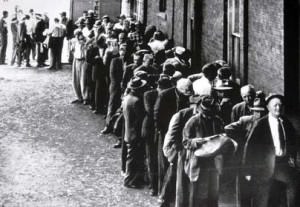Demurrage: A Miracle in the Town of Worgl
Demurrage: the DNA of tomorrow’s financial system?
By Jeff Fritz, Staff Writer
On July 5th, 1932, a miracle took hold in the small, Austrian town of Worgl.
The Great Depression was in full swing and of its population of nearly 5000, a third were jobless, and at about 200 families were bankrupt. The situation was desperate. The town would try anything.
And in these extraordinary times, the town mayor, Michael Unterguggenberger (it’s actually fun to pronounce after the third try), decided on a radical intervention.
The town had 40,000 Austrian schillings left in its reserves. This was nowhere near enough to finance all the redevelopment projects Unterguggenberger planned. So instead, the mayor decided to invest this money into a special savings account as a guarantee to back a new type of money.
Back then, this new money was called ‘stamp scrip’. This is a ‘complementary currency’ that works by placing a kind of usage fee on money. In Worgl, the usage fee amounted to 1% per month of the money’s value, stamped directly onto the paper bills each month. This means that $100 at the beginning of the year would shrink to $88.64 by year’s end, compounded monthly.
As one can imagine, this usage fee turned the whole concept of saving and hoarding of money on its head. Why would you save your money when you know that the more you do, the more it loses its value?
But that’s the trick.
Instead of saving one’s money, stamp scrip creates the incentive to invest. And so did the residents of Worgl. With stamp scrip in place, they spent their money as fast as possible so they could spend it while its value lasted. They would spend on necessities, they would invest in their homes, lend to friends, some even paid their taxes early!
 Meanwhile, the tax revenue, combined with the stamp scrip fee, the town collected was more than enough to help cover both the costs of the town’s redevelopment projects. In fact, the town generated enough money to build new houses, a ski jump and a bridge.
Meanwhile, the tax revenue, combined with the stamp scrip fee, the town collected was more than enough to help cover both the costs of the town’s redevelopment projects. In fact, the town generated enough money to build new houses, a ski jump and a bridge.
But the miracle lay in the fact that amid a global depression, Worgl reached full employment. Again, the key was stamp scrip. The speed that money changed hands (14 times higher than the national schilling) helped keep local businesses afloat and, in time, brought back the town’s lost jobs.
Things looked up for Worgl and Unterguggenberger. The town did so well that six neighbouring villages successfully copied the system and over 200 grew an interest in following suit.
That’s when the Austrian central bank panicked. They saw its monopoly rights on printing and gatekeeping money threatened. As a result, it outlawed Worgl’s stamp scrip system.
Soon after, Worgl saw its unemployment shoot back up to 30%, forcing its fell back into the country’s economic depression (the same happened to all other townships that copied Worgl’s system).
































Share the post "Demurrage: A Miracle in the Town of Worgl"